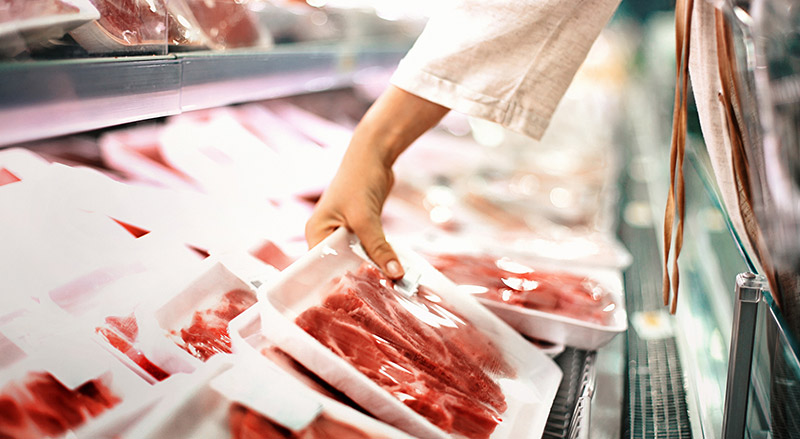FDIC-Insured - Backed by the full faith and credit of the U.S. Government
-
-

-
Chris Kalkowski
Vice President, Agribusiness Banking
Date Published: November 01, 2018
-

Food Safety and the Power of Blockchain Technology
All across the agriculture industry, there is one commitment everyone has in common – producing high-quality, safe food. Ensuring that food safety and quality in agricultural food products are maintained throughout the food system lies at the hands of many parties. Responsibility is shared by producers, processors, transporters, distributors, retailers, restaurants, and consumers, alike.
Since farmers use their land for generations, it is in their best interest to ensure that their land remains healthy and productive, while also striving to produce the highest quality product possible for consumers. Farmers must provide an environment in which plants and animals can develop to their full potential. Factors like land history, water safety, area wildlife, domestic animals, and crop selection are considered before ever planting a crop. The farmer’s task of producing the product is the first step in a lengthy food safety cycle.
It’s important for consumers to know that before food ends up on grocery store shelves, it goes through several safety inspections. These safety checks continue throughout harvest and extend past the crop leaving the field. Some producers will target specific consumer markets through external certification programs. Good Agricultural Practices (GAP) and Good Handling Practices (GHP) are voluntary audits that can be requested to verify fruits and vegetables are produced, packed, handled, and stored as safely as possible to minimize risks of microbial food safety hazards. Many livestock producers are trained in certification programs that address animal well-being and health. Research also continues to improve existing food safety practices. The Beef Industry Food Safety Council brings together all segments of the beef industry to address eliminating foodborne illness.
Government regulations play a role in food safety as well. The Food and Drug Administration (FDA) Food Safety Modernization Act (FSMA) is shifting the focus from responding to foodborne illness to preventing them. The FDA has finalized seven major rules to implement FSMA that are designed to make clear specific actions that must be taken at each point in the food supply chain to prevent contamination.
On top of what America’s farmers and the United States government do to keep food safe, advancements in technology are offering new ways to reduce foodborne illness. For example, traceability through blockchain technology may offer a solution. Blockchain is a single database shared among many participants in which each change to the database is monitored and, ultimately, approved by each participant. This technology would provide growers, processors, distributors, manufacturers and retailers with clear visibility of each step of the supply chain. Blockchain can be used to quickly find the source of contamination and identify where the contaminated product was distributed, which in turn improves consumer confidence. If people become sick from eating a particular food and contaminated lettuce is identified as the source, blockchain would be able to trace the product back to the distributor and ultimately to the original supplier. The product could then be flagged on the blockchain and everyone in the supply chain would be aware of the potential contamination.
Some large companies are already utilizing blockchain in their food supply chains. Walmart and some other food giants have teamed up with IBM to use blockchain to maintain secure digital records and improve traceability of certain products. Walmart in particular is rolling out a new program using blockchain. By next fall more than 100 farms supplying Walmart with lettuce will be required to input detailed information into a blockchain database. Retail giants can use blockchain to not only to track where a product came from, but also to review other data such as temperature, shipment and delivery dates or safety certifications.
Right now, agriculture is in the early phases of blockchain adoption, but it may only be a matter of time before it expands to most major food distributors. The improved consumer confidence that blockchain brings may also be used as a competitive advantage in the marketplace. Consumers may choose to shop from retailers that use blockchain technology because they feel the products are safer or monitored more closely.
When it comes to food recalls, traceability may prevent foodborne illnesses from spreading, but it won’t prevent them from happening altogether. Maintaining the highest food safety standards is always top priority, and will continue to be a baseline commitment of the American agricultural producer.
Interested in learning more about blockchain ? Learn more in our blog post on understanding the potential of blockchain technology.
First National Bank is proud to have been serving agribusiness since 1857. Our knowledge and experience allows us to offer the most innovative agribusiness and finance solutions available, whether your business is beef, pork, grain, ag-supply, processing or any other facet of the industry. Learn more about our agribusiness financing services.
About the Author
Chris Kalkowski has been at First National Bank of Omaha since 1998 and a member of our agribusiness banking team since 2003. As Sr. Director of Agribusiness Banking, he works closely with agribusiness leaders throughout the Midwest. In his spare time, Chris enjoys hunting, ranching and giving back to his local community.
The articles in this blog are for informational purposes only and not intended to provide specific advice or recommendations. When making decisions about your financial situation, consult a financial professional for advice. Articles are not regularly updated, and information may become outdated.
